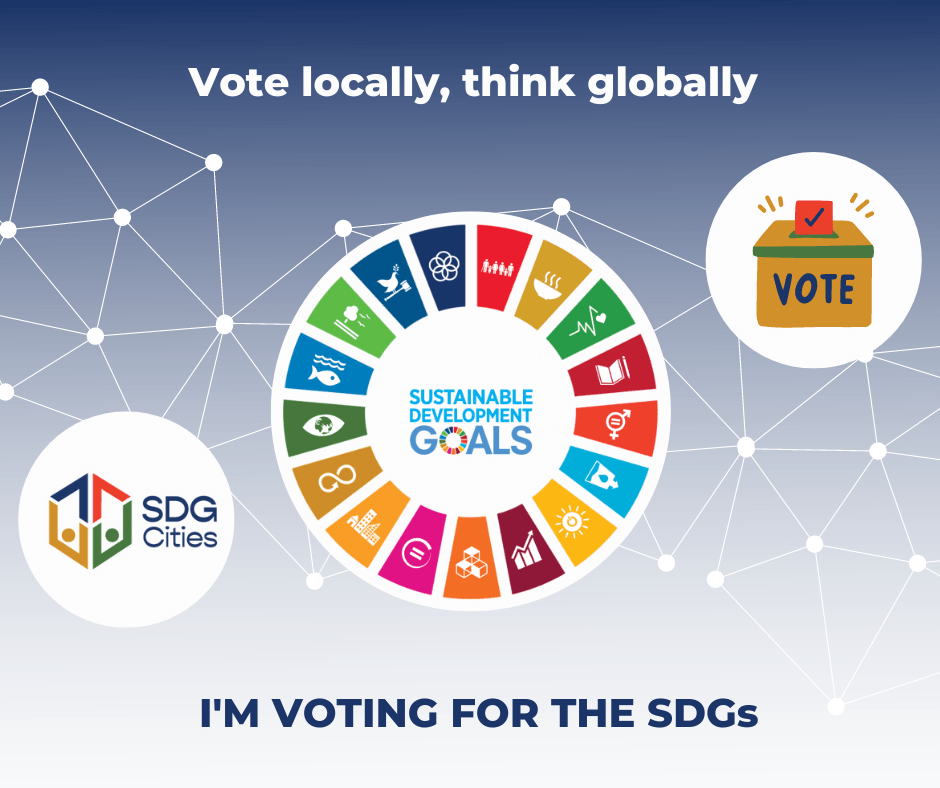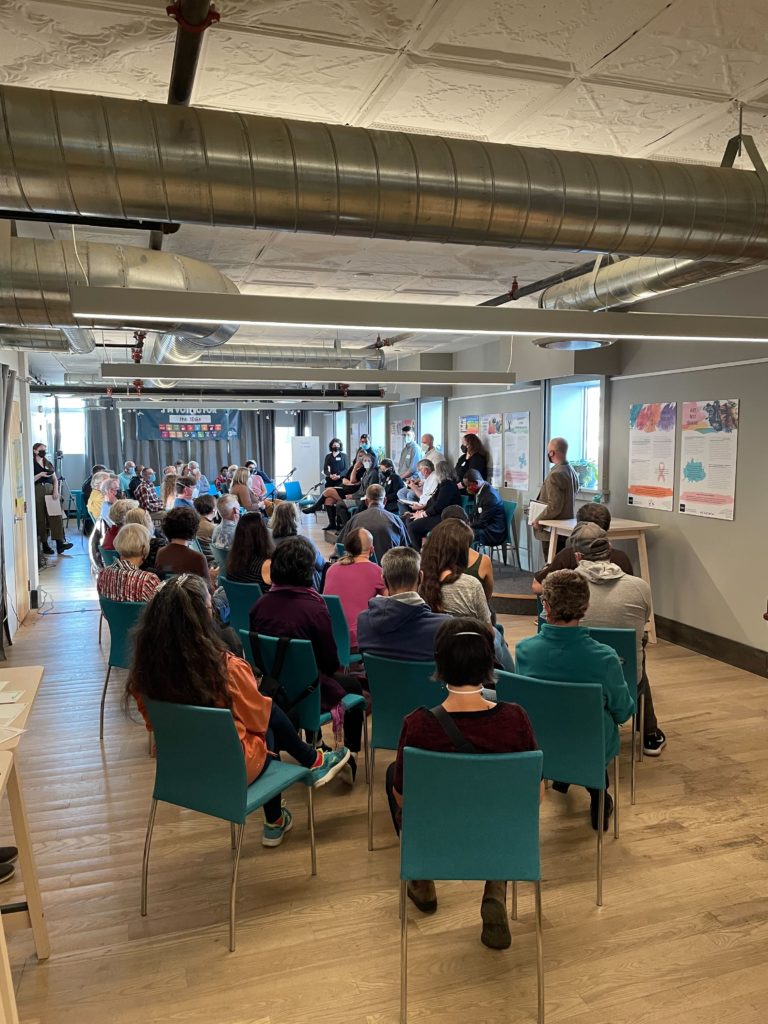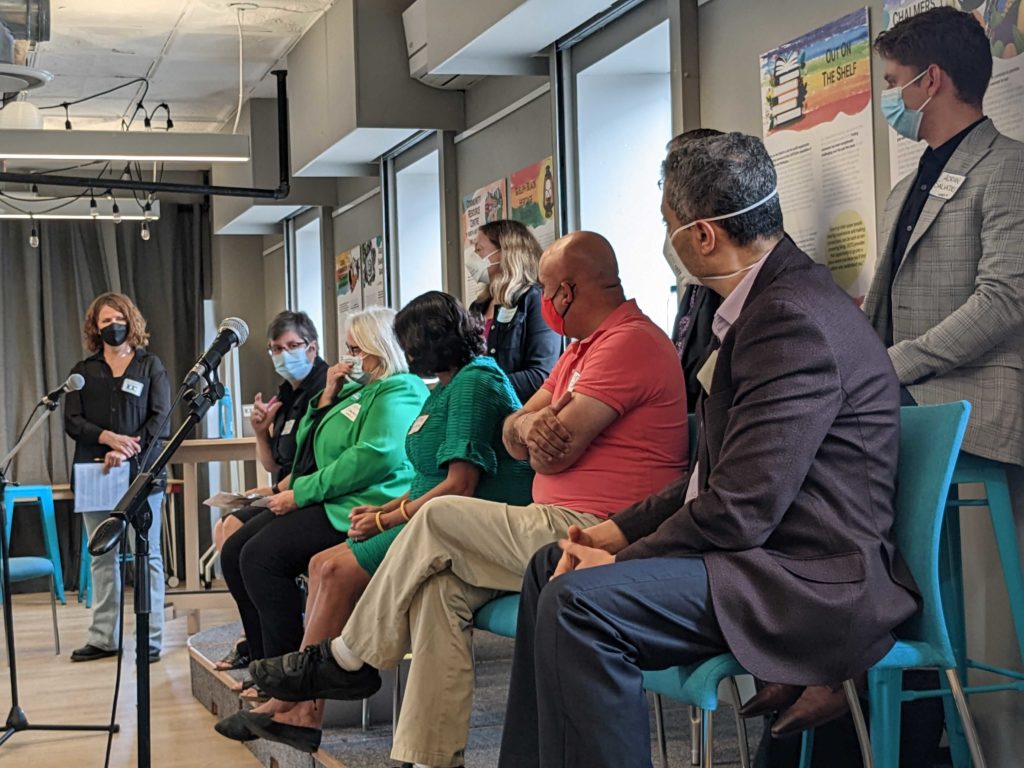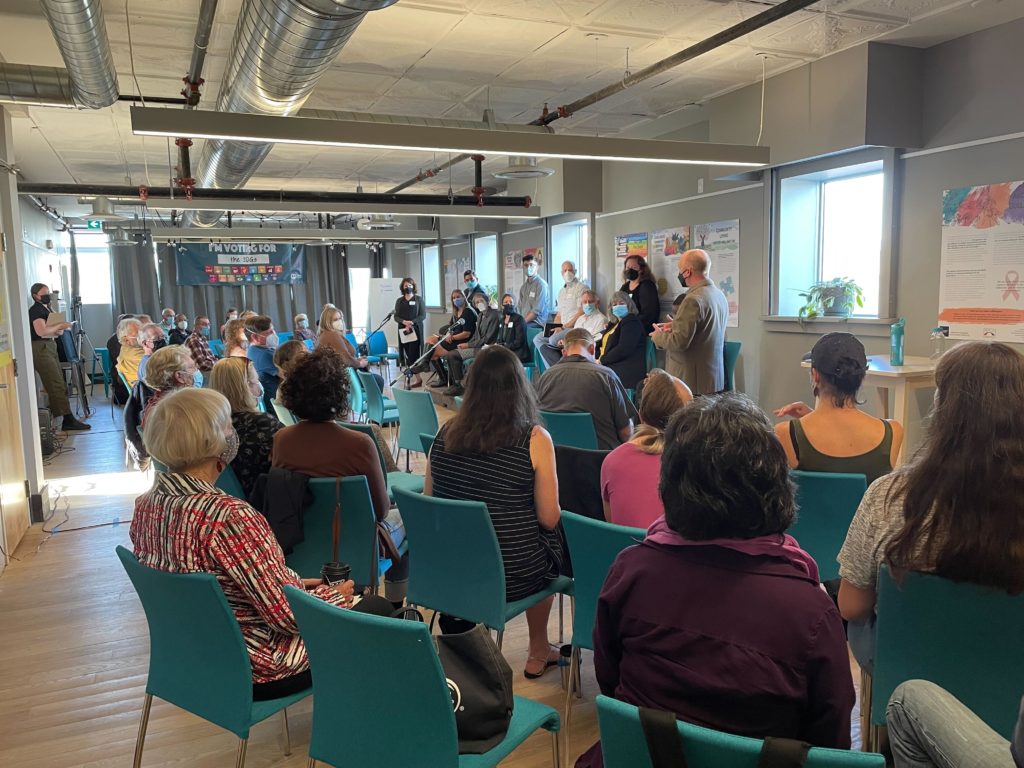Can we make SDG Impact Locally? Municipal Election Discussions with Council Candidates in Guelph
Across Ontario, voters went to the polls in municipal elections this fall. Leading up to the election in Guelph, with few public, all candidates events planned 10C decided to host community conversations to allow the public to learn more about local candidates. This event was inspired by the Provincial Election Town Hall held in May.
These public events were part of a larger effort led by SDG Cities to engage organizations and voters in the municipal election using the lens of the UN Sustainable Development Goals (SDGs). A Municipal Election Advocacy Guide was published by SDG Cities to connect local issues and municipal responsibilities to the SDGs.

In Conversation with Council Candidates about the SDGs
Systems level change represented by the SDGs, will not be possible without action and commitment from the local level. Engaging candidates for local office, and voters in conversations about local issues using the lens of the SDGs.
Through two events held in early October 2022, 10C brought together council candidates from all six Guelph wards for conversations about the SDGs. In addition to framing the issues using the SDG lens, facilitators encouraged candidates to YES, AND…each other’s ideas, building solutions to the challenges we faced in our community. The format emphasized the cooperation and collaboration necessary for achieving the SDGs.
The first event held for council candidates from Ward 1, 2 and 3 hosted 10 of the 22 council candidates running in these three wards. You can watch the recording here.
The second event held for council candidates from Ward 4, 5 and 6 hosted 8 of the 17 council candidates running in these three wards. You can watch the recording here.

Connecting the SDGs and Local Issues
A series of questions were developed through collaboration with 10C members and community organizations. SDG Cities and the 10C team provided SDG framing for these questions – to both give local context to the global issues and provide an opportunity to raise awareness about the SDGs.
The first questions focused on local food systems, recognizing the connection between food insecurity and economic insecurity. SDG 2 is all about working towards food systems that are sustainable, equitable and just – which includes ending hunger and food insecurity worldwide. Household food insecurity is primarily due to financial constraints. Not being able to afford adequate food has significant negative impacts on people’s physical, mental and social health. How will you work to address the needs of people experiencing food insecurity in the community?
Candidates spoke about the value of community gardens and the role the city can play in permitting community food growing and providing funding for these initiatives. There was also mention of the many local organizations who are working to directly alleviate food insecurity at the community level. Some candidates also talked about a municipal role in advocating for universal basic income and an increase to Ontario Disability Support Program (ODSP).
A second question focused on systemic racism and the City’s commitment to eliminating systemic racism in all its forms: A recent amendment to Guelph’s Community Plan added a new priority area called We Are Community. This emerged out of community conversations that made it clear that a more ambitious, immediate, and necessary goal related to equity and anti-racism was needed as in the community. This is closely aligned to a key principle of the SDGs to leave no one behind – recognizing the voices and stories must inform work towards sustainable development. How will you work to achieve the goal of We Are Community and ensure that the City works towards the permanent elimination of systemic racism in all forms?
Candidates recognized the importance of listening and the lack of diversity when it comes to city leadership and the need to listen to those directly impacted by oppressive structures. It was also recognized that a lack of diverse voices in decision making is directly related to the barriers faced by those interested in running for office.
A third question asked candidates to consider their role in ensuring access to affordable housing in Guelph: SDGs 1 and 11 explicitly address the need for affordable and safe housing. Federal and the provincial governments must play a role in funding large scale housing initiatives. Realistically the city cannot fully fund what is needed in Guelph. What role does the city have in lobbying the provincial and federal governments for returning to funding of supportive subsidized and cooperative housing?
Many of the candidates agreed that the municipality has a strong role to play when advocating for the kind of housing needed in our community. Joining other municipalities for a stronger voice when advocating to higher levels of government was a strategy recognized by some candidates. Organizations like the Association of Municipalities of Ontario and the Federation of Canadian Municipalities are coalitions that could be leveraged to support municipalities getting the types of housing they need.
The next question addressed the importance of climate action at the local level and came from Guelph’s Climate Action Coalition led by eMERGE. This question was also posed to all council and mayoral candidates via email, responses collected in writing have been published here. During the live events the following question was posed: Addressing climate change is a global effort. SDG 13 is all about climate – asking that urgent action is taken to combat climate change. Locally, we have work to do to bring down our emissions community wide. Do you support each term of council setting interim, community-wide climate change targets for reduction of greenhouse gas emissions (Yes or No)? And how can our community work together to achieve these targets?
There was a general consensus among candidates that setting interim, community-wide targets is necessary. Some candidates even possessed the question “Why don’t we have these targets already?” When it comes to how we could meet those targets, candidates talked about improving transit, building retrofits and working with housing developers to lower the energy use in buildings.
A final question asked at the public forums addressed how municipal leaders will work to address the calls to action from the Truth and Reconciliation Commission: The National Truth and Reconciliation Commission (NTRC) Calls to Action were published in 2015. The TRC calls on all sectors of society to take Indigenous reconciliation seriously. In order to meet all 17 of the SDGs the leadership Indigenous communities must be recognized and active steps taken towards reconciliation. What actions do you think council, and the community can take to advance reconciliation with Indigenous Peoples and communities in Guelph?
Candidates recognized the role the City must play in creating spaces and places for citizens across Guelph to learn about colonial history, as well as about the ongoing struggles of Indigenous communities. Some made commitments to educating themselves and upholding the principles of decolonization in their work as councillors.
In addition to the questions asked during the live conversations, we collected questions from attendees to better understand the issues top of mind in Guelph. Some additional questions gathered from attendees were presented to candidates for written response. These questions focused on key themes of active transportation, urban development and growth, policing, and civic engagement.


What Did We Achieve?
Municipal council candidate forums focused on the SDGs provided an opportunity for productive, community focused conversations about important sustainability issues amongst decision makers who have the power to make change. It was encouraging to hear from candidates who believe in the vision of the SDGs and are committed to addressing some of the most pressing issues faced at the local level, including: income inequality, housing, climate change and food insecurity.
The events were also successful when it comes to municipal engagement, with 50+ attendees across both live events. Recordings posted online were viewed 115 times.
These conversations are just the start! By engaging candidates in productive conversations focused on the themes of the SDGs – we created space for sharing ideas and solutions about how these issues can be addressed locally. We look forward to engaging more with those candidates elected to serve in council – which for the first time ever is majority women and includes the first openly non-binary person elected to public office in Guelph!
